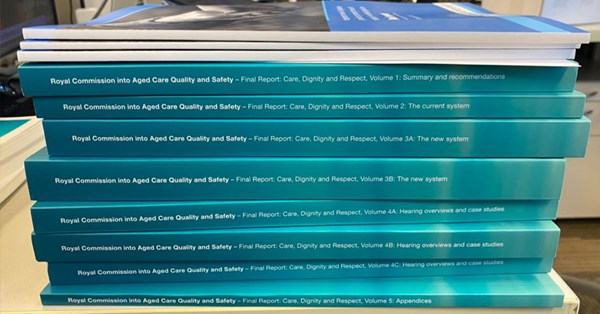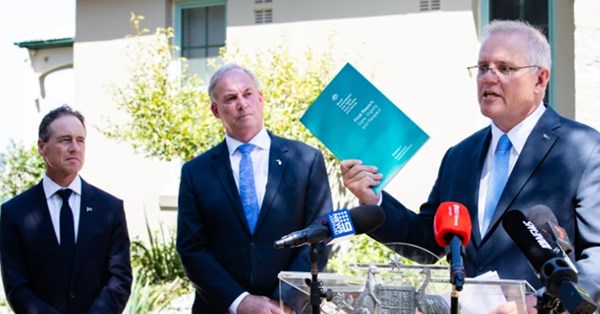Two-and-a-half years after Prime Minister Scott Morrison announced a Royal Commission into Aged Care Quality and Safety following an ABC Four Corners investigation into the sector, the Government has released the Royal Commission's Final Report.
The 2,000-plus-page report – which runs to five volumes and is tellingly titled ‘Care, Dignity and Respect’ – outlines 148 recommendations designed to “assist older people to live an active, self-determined and meaningful life in a safe and caring environment that allows for dignified living in old age”.
However, it appears the divisions between Commissioners Tony Pagone QC and Lynelle Briggs AO – showcased at the Royal Commission’s final hearing last October – have not been reconciled with conflicting recommendations on a number of key issues including oversight of the sector and critically, funding.
“Many of our recommendations and observations are made jointly, but there are some instances where we make differing recommendations and observations. We have agreed, with some misgivings and not without anxious consideration, to make some separate recommendations and to express different views where we diverge. But we both strongly conclude that fundamental change is needed,” Commissioner Pagone writes.

These include:
Oversight of the sector – Commissioner Pagone, a former Federal Court judge, backs the Counsel Assisting’s Independent Commission model presented during the final hearing, while Commissioner Briggs, a former senior bureaucrat, supports a revamped Department of Health and Ageing.
“The adoption of one model over the other will have consequences for many, but not all, of the recommendations we make,” Commissioner Pagone states.
Capital financing for residential care – both Commissioners recommend the phasing out of Refundable Accommodation Deposits, but Commissioner Pagone says that an Australian Government-backed loan facility should be temporary during the transition period to new arrangement – Commissioner Briggs argues the Government should establish an ongoing aged care accommodation capital facility.
A new aged care financing system – the Commissioners agree on the introduction of a levy on taxable income to finance aged care, but differ on its design with Commissioner Pagone suggesting it should be 1% of taxable personal income and hypothecated so it can only be spent on aged care services. Commissioner Briggs however advocates for an ongoing, non-hypothecated levy to meet the costs of the Royal Commission’s recommendations.
A new primary care model to improve access – Commissioner Pagone says the Government should only trial a program for six to 10 years starting from 1 January 2024, while Commissioner Briggs says the Government should simply implement it by 2024.
The Commissioners have agreed on the majority of the other recommendations, including reforms such as:
- A new Aged Care Act.
- A new Aged Care Program combining the CHSP, home care and residential care.
- A single streamlined process to accessing aged care services.
- A System Governor to oversee the system.
- An Inspector-General of Aged Care to identify and investigate systemic issues and to publish reports of its findings.
- A transition to care at home.
- Care that is based on need, not rationing.
- Increased support championed by Commissioner Briggs for development of ‘small household’ models of accommodation.
- A more restorative and preventative approach to care, with increased access to allied health care in both home and residential aged care.
- Equity for people with disability receiving aged care.
- No younger people in residential aged care.
- Professionalising the aged care workforce through changes to education, training, wages, labour conditions and career progression.
- Registration of personal care workers.
- A minimum quality and safety standard for staff time in residential aged care, including an appropriate skill mix and daily minimum staff time for registered nurses, enrolled nurses and personal care workers for each resident, plus 24/7 RNs (not mandated minimum nurse-to-resident ratios).
- New approval requirements for providers including home care operators plus graded assessments against the Quality Standards and performance ratings.
- A new Complaints Commissioner.
- Civil penalties of providers that breach the general duty to provide high-quality care.
- Wider enforcement powers for the quality regulator.
- Improving aged care through data, research and technology.
- Immediate changes to the Basic Daily Fee.
- Amendments to the Viability Supplement.
- An independent Pricing Authority to determine the costs of delivering services.
- A new funding model for care at home based on individualized funding or a case mix model.
- Case mix-adjusted activity based funding in residential aged care.
- Incentives for an enablement approach to residential care.
- Fairer means testing with no co-contributions for care (as compared to costs of living and accommodation), social supports, domestic assistance and respite care.
- Improved prudential regulation and financial reporting.
The Commissioners are clear that they do not expect their competing recommendations to prevent the Government from reforming the system.
“Our disagreement about the best way for improvement to be achieved is not a justification for doing nothing,” Commissioner Pagone writes.

Speaking at Kirribilli House today following the report’s release, Prime Minister Scott Morrison said the report provides the Government with what it needs to know to “bring about the generational change that is needed.”
Mr Morrison pledged $452.2 million to the Government’s initial response, which is built on five “pillars”:
1. Home care
2. Quality and safety
3. Services and sustainability
4. Workforce; and
5. Governance
These pillars include immediate measures, including:
- $18.4 million for greater oversight of home care packages, program of audits of home care providers to reduce unjustified administrative charges, and better fraud controls.
- $32 million for strengthening provider quality including expanded powers for the Aged Care Quality and Safety Commission including a “senior restraint practitioner” to boost regulation of physical and chemical restraints.
- $279.9 million for residential care temporary financial support including continuation of the 30% rise in homeless and viability supplements until the end of June, and targeted support for residential aged care providers in financial stress.
- $91.8 million to attract 18,000 job seekers to enter the home and residential aged care workforce.
- $30.1 million for Governance including training for aged home board members, stronger quality standards, and an overhaul of the Aged Care Act which has been in place since 1997.
The PM was less committed however to the report’s five-year timeframe, saying that the scale of change would take “quite considerable time to achieve”.
“We must also take care in how we do this,” he suggested.
He won’t have much time to reflect though.
The next step is for the Government to meet a 31 May deadline set by the Commissioners to report to Parliament on its response to the 148 recommendations.
With so many divisions throughout the report, which way will the Government finally land?
You can download the 115-page executive summary here.
We will have a report in Thursday’s SOURCE on the report and its fallout.










